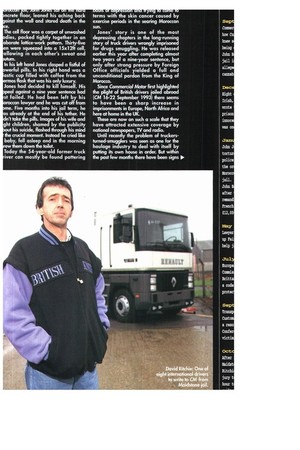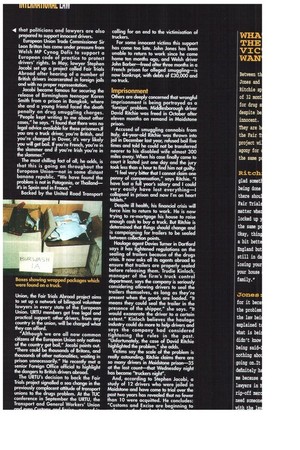ncrete oar, leaned his aching back ainst the wall and stared death in the e.
Page 47

Page 48

If you've noticed an error in this article please click here to report it so we can fix it.
The cell floor was a carpet of unwashed dies, packed tightly together in an aborate lattice-work pattern. Thirty-five en were squeezed into a 15x12ft cell, allowing in each other's sweat and m.
In his left hand Jones clasped a fistful of werFul pills. In his right hand was a astic cup filled with coffee from the ermos flask that was his only luxury. Jones had decided to kill himself. His peal against a nine year sentence had st failed. He had been left by his oroccan lawyer and he was cut off from me. Five months into his jail term, he as already at the end of his tether. He dn't take the pills. Images of his wife and ght children, shamed by the publicity his suicide, flashed through his mind the crucial moment. Instead he cried like baby, fell asleep and in the morning rew them down the toilet.
Today the 54-year-old former truck iver can mostly be found pottering terms with the skin cancer caused by exercise periods in the searing Moroccan sun.
Jones' story is one of the most depressing chapters in the long-running story of truck drivers wrongly imprisoned for drugs smuggling. He was released earlier this year after completing almost two years of a nine-year sentence, but only after strong pressure by Foreign Office officials yielded a full and unconditional pardon from the King of Morocco.
Since Commercial Motor first highlighted the plight of British drivers jailed abroad (CM 16-22 September 1993) there seems to have been a sharp increase in imprisonments in Europe, North Africa and here at home in the UK.
These are now on such a scale that they have attracted extensive coverage by national newspapers, TV and radio. Until recently the problem of truckersturned-smugglers was seen as one for the haulage industry to deal with itself by putting its own house in order. But within the past few months there have been signs that politicians and lawyers are also prepared to support innocent drivers.
European Union Trade Commissioner Sir Leon Britian has come under pressure from Welsh MP Cynog Dafis to support a European code of practice to protect drivers' rights. In May, lawyer Stephen Jacobi set up a project called Fair Trials Abroad after hearing of a number of British drivers incarcerated in foreign jails and with no proper representation. Jacobi became famous for securing the release of Birmingham teenager Karen Smith from a prison in Bangkok, where she and a young friend faced the death penalty on drug smuggling charges. "People kept writing to me about other cases," he says. "I found that there was no legal advice available for these prisoners.lf you are a truck driver, you're British, and you're charged in Dover, it's very likely you will get bail. If you're French, you're in the slammer and if you're Irish you're in the slammer."
The most chilling fact of all, he adds, is that this is going on throughout the European Union—not in some distant banana republic. "We have found the problem is not in Patagonia, or Thailand— it's in Spain and in France."
Backed by the United Road Transport Union, the Fair Trials Abroad project aims to set up a network of bilingual volunteer lawyers in every state of the European Union. URTU members get free legal and practical support other drivers, from any country in the union, will be charged what they can afford.
"Although we are all now common citizens of the European Union only natives of the country get bail," Jacobi points out. "There could be thousands of Britons, and thousands of other nationalities, waiting in prison unnecessarily." He recently met a senior Foreign Office official to highlight the dangers to British drivers abroad, The URTU's decision to back the Fair Trials project signalled a sea change in the previously complacent attitude of transport unions to the drugs problem. At the TUC conference in September the URTU, the Transport and General Workers' Union calling for an end to the victimisation of truckers.
For some innocent victims this support has come too late. John Jones has been unable to return to work since he came home ten months ago, and Welsh driver John Barber—freed after three months in a French prison for alleged smuggling—is now bankrupt, with debts of £30,000 and no truck.
Imprisonment
Others are deeply concerned that wrongful imprisonment is being portrayed as a 'foreign' problem. Middlesborough driver David Ritchie was freed in October after eleven months on remand in Maidstone prison.
Accused of smuggling cannabis from Italy, 44-year-old Ritchie was thrown into jail in December last year, refused bail five times and told he could not be transferred nearer to his disabled wife almost 300 miles away. When his case finally came to court it lasted just one day and the jury took less than a hour to find him not guilty.
"I feel very bitter that I cannot claim one penny of compensation," says Ritchie. "I have lost a full year's salary and I could very easily have lost everything—I collapsed in prison and now I'm on heart tablets."
Despite ill health, his financial crisis will force him to return to work. He is now trying to re-mortgage his house to raise enough cash to buy a truck. But Ritchie is determined that things should change and is campaigning for trailers to be sealed between collection points.
Haulage agent Davies Turner in Dartford says it has tightened regulations on the sealing of trailers because of the drugs crisis. It now asks all its agents abroad to ensure that trailers are properly sealed before releasing them. Trudie Kinloch, manager of the firm's truck control department, says the company is seriously considering allowing drivers to seal the trailers themselves, as long as they're present when the goods are loaded. "It means they could seal the trailer in the presence of the shipper," she says. "It would exonerate the driver to a certain extent." Kinloch believes the haulage industry could do more to help drivers and says the company had considered tightening the rules in the past. "Unfortunately, the case of David Ritchie highlighted the problem," she adds. Victims say the scale of the problem is really astounding. Ritchie claims there are so many drivers in Maidstone prison-35 at the last count—that Wednesday night has become "truckers night".
And, according to Stephen Jacobi, a study of 12 drivers who were jailed in Maidstone and have come to trial over the past two years has revealed that no fewer than 10 were acquitted. He concludes: "Customs and Excise are beginning to






































































































